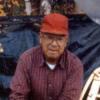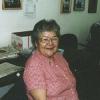 ,
, 
Steven and Catherine Attla were interviewed on July 22, 1992 in Huslia. The interview took place in the living room area of their home. On tape Catherine talks about how she grew up, how she was adopted by her grandparents while still a baby, and how as a teenager she worked like an adult. With Steven, she talked about the summers while their children were growing up that he spent away working. She also talked about how through evening classes, she's managed to acquire roughly a 7th grade education even though as a youngster, she never went to school.
Finally she talked about some of her experiences interacting with government agencies. She worked as a translator right after the Alaska Native Claims Settlement Act was passed. She was hired to travel around to several villages in the Interior helping to inform people about the Act. She has also served for 16 years on the local Fish and Game Advisory Board, and in discussing her experiences, she talked about subsistence issues. She has also worked in the school passing on her knowledge of her culture. She believes this kind of effort is very important.
On the tape Steven talked about how Huslia came into being, shaped in its early days by the desire to have a school. Efforts by his father and Jimmy Huntington, who believed their children deserved an education, and the help of Bishop Gordon of the Episcopal church eventually led to a school being built, equipped, and staffed by a teacher. He talked about how this first school came about. Historic ties to the Kobuk area and the travel and trade those ties entailed were another topic we discussed. Steven also talked about various stores and traders along the river who had helped the Native people.
Digital Asset Information
Project: Gates of the Arctic National Park
Date of Interview: Jul 22, 1992
Narrator(s): Steven Attla, Sr., Catherine Attla
Interviewer(s): Wendy Arundale
After clicking play, click on a section to navigate the audio or video clip.
Sections
1) Steven's parents and growing up in the area
2) Steven's career as a boat pilot on the rivers
3) Catherine's upbringing
4) Slowly changing ways in the old village
5) Early adult education in the village
6) Subsistence issues and change
7) Catherine talks about game laws and working on the Alaska Department of Fish and Game Advisory Committee
8) Passing on cultural knowledge and old-timers
9) Historic ties to Kobuk
10) Early trade along the river
Click play, then use Sections or Transcript to navigate the interview.
After clicking play, click a section of the transcript to navigate the audio or video clip.
Transcript
Section 1: Attla, George -- father from Hughes\ Eliza -- mother born in Hughes\ Cutoff -- village\ trading post\ storekeeper\ Jones\ Dulbi Slough\ cabin -- 1927\ born -- Steven 1924\ fishing -- Yukon\ trapping -- father tended line like a farmer\ beaver -- trapped, used heads at fox den\ father -- died 1969|
Section 2: pilot -- twenty-four years, quit 1970\ license -- boat pilot's; Steven only Native to have in 1965\ test -- good memory\ Chena River -- barge test\ mapping -- had to draw the rivers\ tough times -- raising kids, broth instead of milk|
Section 3: Cutoff\ born -- 1927\ grandparents -- mother's parents raised her\ grandmother -- died, 1940\ dogteam -- Catherine took over\ tough times -- struggle to self-teach English, run house|
Section 4: subsistence\ Grandpa Sammy\ Attla, George Sr.\ hunting -- rabbit, chicken, grouse, ptarmigan; hardly any moose\ isolation -- no post office 'till 1947; no school\ missionaries\ Cutoff\ beliefs -- Indian way\ Attla, George -- got kids through school\ Holy Cross -- school\ children -- sent to school\ chief -- looked to the future\ Huntington, Jim -- wrote Juneau about school\ school -- denied, flooding prevented\ Huntington -- started store, 1940s\ village -- moved, 1949-50\ Gordon, Bishop -- offered deal on school\ school -- built, 1950\ teacher -- started, 1950|
Section 5: education -- adult, evening courses\ trapping -- had to break for\ Attla, Steven\ Attla, George\ Frank, George Sr.\ Almonson, Harriet -- teacher|
Section 6: subsistence -- critical to local people\ bush -- money is out on the land\ land -- life depends upon\ fish camp -- 1952, last year out\ school -- staying in village\ changes -- food stamps; energy assistance; Aid For Dependent Children\ subsistence -- still need it|
Section 7: culture -- difference\ women -- not supposed to talk about bears\ hunting -- never directly discuss plans\ permits -- require to break Native cultural rules\ Hutlannee -- taboo; rules regarding game|
Section 8: Fairbanks -- Catherine taught at elementary school\ values -- share what you know, nobody is better or worse than others\ Olin, Francis -- grandfather\ Dulbi River\ Justine -- grandmother\ grandma -- Madeline\ father -- Galena\ Charlie, Larson\ Olin, Mary -- mother\ Charlie, Mary -- now\ Vent, Mary|
Section 9: Kobuk -- travel by dogteam\ trade\ grease\ seal oil\ grandfather -- travel\ Cutoff\ Hot Springs\ Huslia River\ North Fork\ Selawik River\ Pick River\ travel -- choosing route based on conditions\ trip -- 1938; uncle\ Allakaket\ potlatch\ travel -- recent\ Shungnak\ Ambler\ Kobuk\ seal skin\ hides -- moose, wolverine\ beads|
Section 10: Cutoff\ grandfather -- trader; lost money\ Vernetti, Dominic -- Koyukuk\ Grandma Christine -- sister\ Nulato\ Sommers, Johnny and Agnes\ Cutoff -- isolated\ Dulbi Slough\ barge -- taken apart to build cabin\ Grandpa Sammy -- lost two stores\ Auntie Lydia\ Auntie Celia\ Attla, George Sr. -- brought Sammy home\ cabin -- "lumber cabin" built out of barge\ Simon, Edwin -- took picture of cabin in 1935\ store -- lost money, but helped a lot of people|

